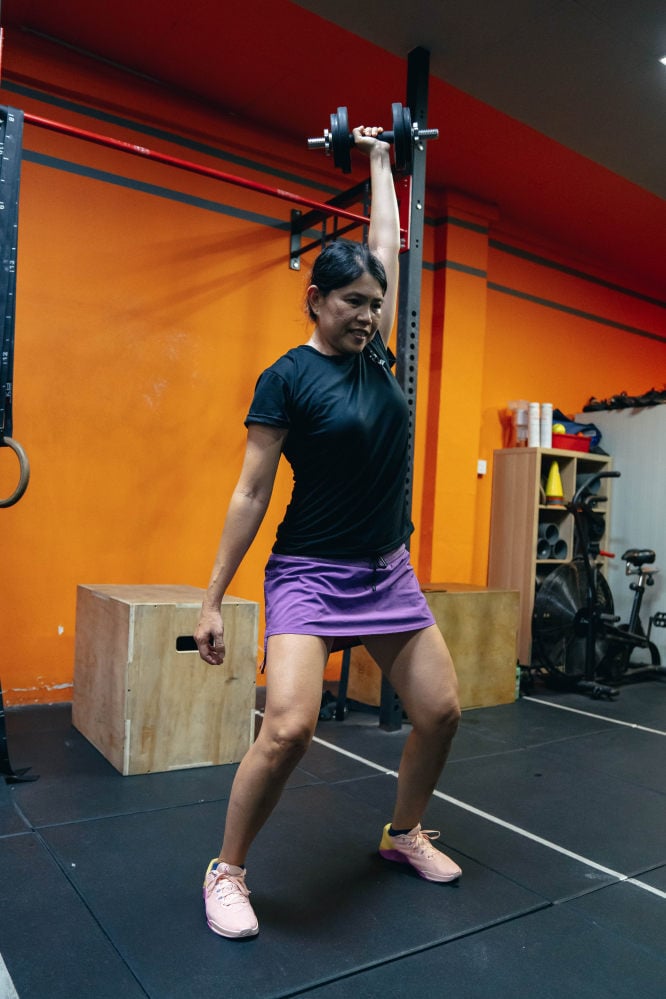How to prevent middle-age weight gain – exercise, eat right, get enough sleep … and start now. Click here.
How to prevent middle-age weight gain – exercise, eat right, get enough sleep … and start now
- Besides not getting enough exercise and healthy foods, there other challenges we face in midlife that might affect our ability to maintain a healthy weight
- Muscle loss and hormonal changes are a part of ageing, but we can prevent weight gain if we have ‘a disciplined regime, built around diet, fitness and sleep’
After she turned 40, Eunice Su-Ai realised that keeping fit was not as easy as it was before. In her 20s, she took part in triathlons, ran 12km (7.5 miles) every weekend, and hiked and climbed mountains regularly.
Now, at 46, she says that recovering from strenuous exercise is harder and she doesn’t have the same energy she used to have.
The freelance executive coach and trainer makes it a point to stay active, pounding the nature trails where she lives in Singapore, cycling every week and doing strength-training exercises at her local gym, Red Dot Fitness.
“I tell people that I exercise to stay healthy, but the truth is that I love eating and indulge in all kinds of food – even unhealthy ones – so I exercise mainly to keep the excess [weight] at bay,” says Su-Ai. “I’m blessed to have a fast metabolism, but at this age I can’t just eat whatever I want and expect to stay in shape without working out.”

“Muscle loss is a big one – this occurs at a rate of one per cent per year after the age of 40,” says Dr Vincent Lau, doctor-in-charge at Matilda Clinic in Central on Hong Kong Island. “Muscle mass is the main calorie-burning engine in our body.
“Muscle loss, in turn, results in a decline in our basal metabolic rate, which means that we burn fewer calories during periods of rest. So, even if we don’t consume as many calories as we used to, we still end up with a surplus of calories. These extra calories are stored in the body as fat.”
Carrying extra kilos during middle age can have long-term health consequences. Researchers at Vanderbilt University Medical Centre in Nashville, Tennessee in the United States, analysed two studies to find out how weight gain from the age of 20 into the middle-age years impacted health outcomes in later life.

They discovered that every 5kg (11lb) of weight gain was associated with an increased risk of all-cause deaths by around 10 per cent and of cardiovascular disease death by 20 per cent among those who were overweight at middle adulthood.

“Middle-age weight gain is avoidable, so long as you adapt your lifestyle to the natural changes that occur as we age, such as hormonal fluctuations and a slowing metabolic rate,” says Ivan Corsi, founder and director of Hong Kong’s Athletic Club – Personal Training. “A disciplined regime, built around diet, fitness and sleep, can help.”
Although he agrees that ageing impacts the body, Corsi rejects the view that ageing and weight gain are always linked. “Gaining weight as you age is due to not adapting your lifestyle to ageing. You shouldn’t be held hostage to a slowing metabolic rate or hormonal changes.”

“I always feel amazing after I work out,” she says. “When I started at the gym about a year ago, I had no idea what to do with the barbells and medicine balls, but as time went on – even through our online classes during our stay-at-home order – I improved. As for my diet, it’s hard to eat healthily, especially in a food paradise like Singapore, but I do try, and when I eat I go slow and have small portions.”
Even if you’re already middle-aged, it’s not too late to make positive lifestyle changes to start seeing a difference in your weight and health.

Corsi says that any adjustments you make should be realistic and sustainable. Avoid diet fads, he says, and don’t implement radical changes that you won’t be able to maintain.
If you’re still some years away from middle age, don’t delay losing weight or getting into better shape – it can help extend your life.

A Boston University School of Public Health study, published in 2020 in Jama Network Open, found that changes in weight between early adulthood and midlife might have important consequences for one’s risk of premature death.
The researchers reported that participants whose body mass index (BMI) went from the “obese” range in young adulthood down to the “overweight” range in middle age halved their risk of dying during the study period, compared to those whose BMIs stayed in the “obese” range. Even a small amount of weight loss now when you’re young can help when you’re older.
“I exercise not just to stay fit and trim but also to build and strengthen muscle, balance my hormones and stave off serious health conditions like osteoporosis and arthritis,” says Su-Ai.
“Exercise also sharpens my focus, gives me mental clarity and makes me feel good. I’m a big-time food lover but I find that the healthier I feel overall, the less I crave sweet and processed foods and the better I eat. What I’m doing now will affect my quality of life for the next 40 years or more, so I keep at it.”













Comments
Post a Comment